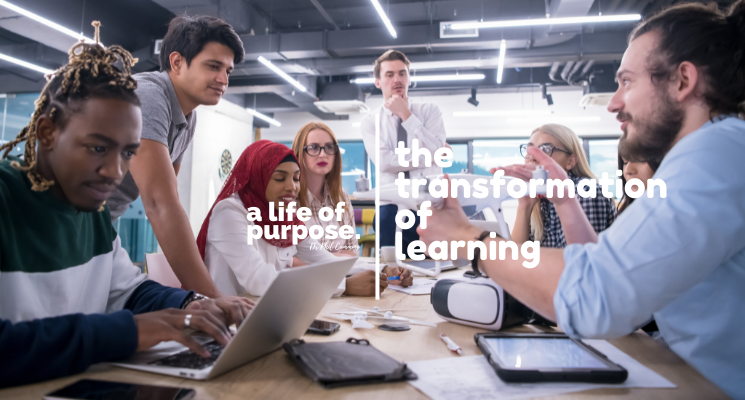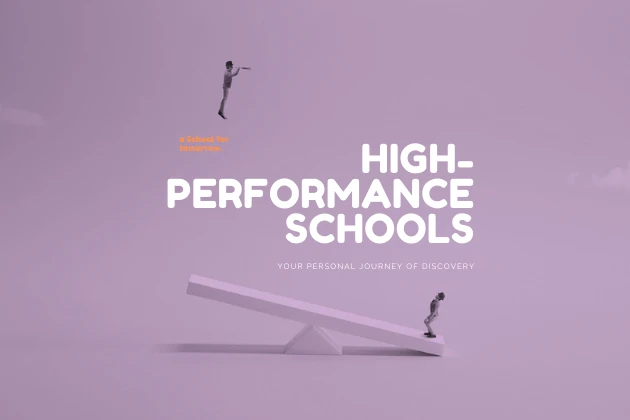
Dr Phil Cummins
Jun 9, 2022 | 6 minute read
Work: Be Future-Fit
For some time now across the world, governments, community groups, and society at large have been telling us that education is really, really important.
Promotion
a School for tomorrow's
Community Membership
Come together in our global community of innovative, like-minded people and help create the future of education.
Join CommunityThe Secret Sauce
For some time now across the world, governments, community groups, and society at large have been telling us that education is really, really important. We shouldn’t be surprised about this as we’ve been telling them the same message for years now!
Increasingly, they’re now telling us that we need to change what we do in schools so that we and our students are future-ready and future-fit. Some of us enjoy this challenge while others look on it with scepticism. Others like the idea in theory but feel weighed down by the demands of the present. Many step forward and up to meet the challenge with cautious optimism about this shared enterprise.
I suspect that the responses of most educators to the requirement to be future-ready and future-fit may well correlate quite closely to the nature of their personalities more than anything else. At the same time, regardless of our inherent preferences, there is no doubt that we in schools must face the reality that as our world changes, so too must we adapt what we do and why we do it to the needs of the society which we serve.
And as a result, we've got an education system that actually has to think now about 'What is its purpose?', 'Where is it going?' and 'Is it doing a good job?' I wonder often what the different groups of people across society think about the role of our schools. We’ve got the hopes of families about personal wellbeing, fulfilment, and social mobility. And then, we've got national aspirations for the economy and society. And we've got the aims of the students themselves – frequently more concerned about the social experience of lunch but sometimes even about the learning itself! All of these end up mixed into one asphalt playground with lots of Four-Square courts on it.
At a School for tomorrow, in the broadest sense, we think that character is the reason why we do school; it’s the whole work of a school. In this respect, our job is to prepare students to thrive in the world of tomorrow. Our work, therefore, in no small part needs to be about preparing them for their work. We need to model, coach, and scaffold the adaptive expertise and self-efficacy that is at the heart of being future-ready and future-fit. This is why we talk about the new social contract for education: today’s learning for tomorrow’s world.
There is a secret sauce to the culture of a school that honours this social contract, the formulation for which has emerged from our own global research program into high-performance learning. What is this secret sauce?
- We equip our students with aspirations, a sense of kinship, and pathways to success.
- We empower them by helping them to feel as though they belong to and are engaged in a school community that keeps them in their groove and holds them to an educational purpose of the pursuit of excellence through character.
- We enable them to do this by consciously crafting relationships at all levels that inspire, challenge, and support them every day to demonstrate the character, competency and wellness to achieve the graduate outcomes towards which all learning in the school is directed.
I'm excited and encouraged by the way in which so many educational leaders understand this. I’m also pleased to note how many have been sharing with the broader community the efforts of their staff to enact this secret sauce in their schools over the past couple of years. I think we need to keep going with this process and take it even further.
How often do we as leaders connect with and reflect deeply on the impact of our people and our place on the potential of our school communities to concoct this secret sauce in a way that is unique to who we are and who we are becoming? How often do we as leaders allow ourselves unhurried and uncontested space to reflect on what’s working well and what we should do more of with that most precious of our resources, our time?
None of us is perfect and, if you're like me, you probably pay more attention to your disappointments and experiences of adversity than you do to your successes, although we must also be mindful that what we learn from triumph is just as important and valuable as what we learn from failure – the different context just gives us a different type of learning along the way.
Hope And Courage
There are many colleagues across the world who need both the freedom and the cultural permission granted by routine to reflect on what is working well for them and their students. They need to do this personal-professional introspection and recalibration of their models and methods of work in an authentic fashion. They need to contemplate evidence of the growth and progress of their students. They need to do this in the full knowledge that, just like their students, they will need to embrace a process of learning through temporary failure.
Yet, the reality is that too many of our colleagues will talk to you instead about a workplace characterised by the unbearable pressure of expectation. They will speak to you of perceived cultures in which no one is allowed to make a mistake. They will relay anecdotes about the harsh and swift judgment of parents, students, colleagues, and leaders. They will reveal an assumption that a well-intentioned error or an unexpected outcome that shows progress on their part without complete accomplishment, will be met by punishment.
Often when we go to schools where the systems and structures are not working particularly well, people will talk in terms of low trust and high suspicion. They'll also talk about the challenge that they face personally about potential infractions against minor rules, often catastrophising potential consequences that amplify a climate of fear. Little will be risked and the bare minimum required to meet standards of compliance will be viewed as a viable strategy.
As a result, there are low levels of the individual and collective hope and courage required to view the job at hand as a work in progress where perfection is neither necessary nor desirable and, instead, innovation, experimentation, and play are encouraged.
Add to this an overwhelming sense of the volume, pace, and intensity of change throughout society, and many teachers either think they are failing or have just given up in the face of all this. I think the practical realities of finding yourself implanted in a life of work as a teacher that denies you your own sense of voice, agency and advocacy becomes very, very challenging.
As a consequence, I don't see enough schools where enough teachers themselves think that they're thriving. Even worse, we see that too many teachers have become lost in a cycle of despondency that sees them out of touch with an appreciation of what is good and bountiful in their work. Too many can only see negativity. They lack gratitude for the opportunities that are presented to them to use their capacity and their experience. Instead, they're standing still, waiting for the world to happen to them or to save them.
They look to others to redress past wrongs, to remediate their present condition, and to provide a new future. They've lost that sense of confidence in the reciprocity and interdependence that are essential to any community that's equipped, empowered and enabled with the voice and agency required to thrive in the new world environment. They cannot turn adversity into opportunity, and they no longer seem to be able to take the big step forward and up.
Of course, the damage caused by all of this can only be repaired by relationships that demonstrate integrity and meaningfulness, and systems and operations that provide for a fair exchange of both values and value propositions over time. The benefit of a way forward for all needs to be clear and the means by which these solutions are sought need to be transparent and fair.
In the story we tell of the way forward in how we work towards today’s learning for tomorrow’s world, we need to see the esoteric benefit of values of hope and courage allied to value that is demonstrated through the tangible receipt of a financial benefit that recognises and honours the work done by teachers in exchange for it. Some of our colleagues might see this ostensible commercial reality as distasteful but even they need to pay the bills and put food on the table while dwelling on their intellectual and aesthetic pursuits. Values and value must always be present in our workplaces, even in the lives of those who ennoble the former while decrying the pursuit of the latter. Someone has to pay – how we do that is the real question.
To this, I’d note that the necessary and (I think) honourable quest to find the means to support yourself and your family through your labour and intellect is always more volatile and responsive to the world around us. Thus, while the exchange of worthy values should and do tend to remain more or less constant, the means that make the investment of time, effort, money, emotion and other forms of capital into working out the most worthwhile way to secure value should be subject to the greatest flexibility and responsiveness to the currents of the world around us. In this way, we can also see how continuing values are supported by the robustness of our character, while the changeability of value reflects how we can practise resilience in seeking to fulfil our purpose.
If we want our students to be robust and resilient then we need to learn to be like this individually and collectively ourselves. We can’t give up. If we want our students to be bold, adventurous, take risks, and show both hope and courage, then we as adults have got to do the same thing. We can’t give in to fear.
We need to create a clear and shared expectation that all contribute to the culture of hope and courage required to generate that special sauce that equips, empowers, and enables young people to be future-ready and future-fit. To lift ourselves to meet that expectation, it can take a real act of everyday courage, the courage to step forward and to teach and lead in a very human and a very determined way. We all need the support of a climate of hope to adopt the certainty to say that “There’s a better way of doing today’s learning for tomorrow’s world” even when we don’t know all of the answers in advance and we’re building the bridge from yesterday to today to tomorrow as we go.
In creating solutions within the workplaces of our schools to prepare our students for the workplaces of the future, we need to think about more than just the outcomes and the trajectory that we want for our students. We also have to be five steps ahead to ensure we are supporting the growth and achievement of our colleagues who are supporting the growth and achievement of our learners. As leaders, we need to create the conditions and culture that are going to help students and teachers and communities alike to thrive.
Related Content

Products & Services
Discover our Strategic Educational Development ProgramsLike what you’ve read?
Let’s keep the conversation going.

